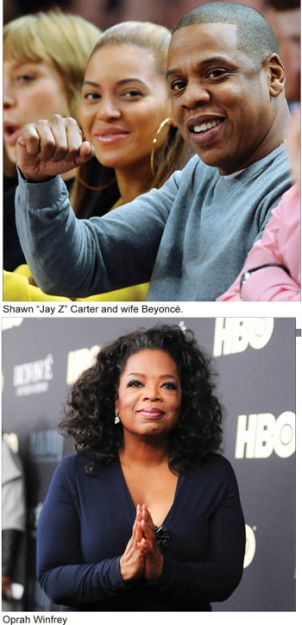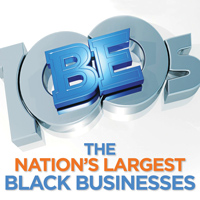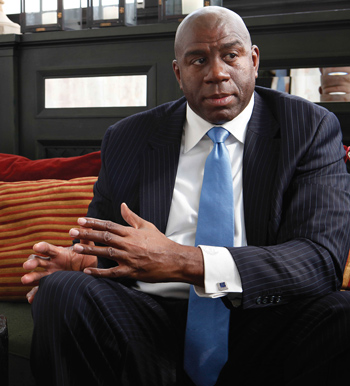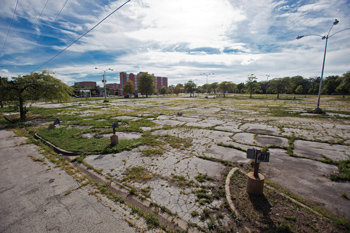In the black and the green
By Ashahed M. Muhammad -Assistant Editor- | Last updated: Jul 8, 2014 - 7:35:32 PMWhat's your opinion on this article?

|
CHICAGO (FinalCall.com) - Despite upward trending employment statistics and financial achievement for some Blacks, the key to establishing generational wealth is not necessarily landing a good job or making it big on the stage or screen.
Entrepreneurship is the key to achieving sustainable wealth, according to analyst Kimberly N. Alleyne, senior director of marketing and communications for the Association for Enterprise Opportunity in Washington, D.C.
“The other thing it does is that when you start a business you create a job. So not only is the person creating a job for him or herself but if the business proves to be profitable and that business owner is able to access the resources that he or she needs, you can hire other people and then can grow your business by expanding and hiring,” said Ms. Alleyne.
Although being an entrepreneur takes effort and self-confidence, through research and gaining access to the right people and knowledge of what is available, success can be achieved, she said. For example, there are government programs for Black women entrepreneurs, as well as networking opportunities for low income and residents of rural areas.

|
“The BE 100s—the nation’s largest Black businesses—continue to be the standard bearers for all American enterprises, demonstrating that sustained business growth comes when ideation and innovation is wedded to execution and excellence,” said Black Enterprise Senior VP/Editor-in-Chief Derek T. Dingle. “As such, most exhibit elasticity, capability, technological adaptability and branding power in a seesaw economic recovery and hyper-competitive business environment,” he added.

Earvin “Magic” Johnson
|
“Although we have protested government and the business community for years calling for ‘jobs and justice,’ we will only approach that principle of fair dealing when entire communities negotiate not only to become employees, but also the owners of the companies that profit from our consumption,” commented economist and author Cedric Muhammad.
Economic recovery?
President Barack Obama was upbeat July 3 as he announced America has seen the fastest job growth in the first half of the year since 1999. It was also the first time there has been five consecutive months of job growth over 200,000 since that same year. Some 288,000 positions were added which was well over the previously predicted 215,000 for the month of June. Despite the good news, he stopped short of declaring total recovery.
“Now, what we also know is, as much progress as has been made, there are still folks out there who are struggling. We still have not seen as much increase in income and wages as we’d like to see,” said President Obama. “A lot of folks are still digging themselves out of challenges that arose out of the Great Recession,” he added.

Kimberly N. Alleyne, senior director of marketing and communications for the Association for Enterprise Opportunity.
|
The Labor Department’s statistics indicated Black unemployment fell from 11.5 percent in May to 10.7 percent in June, however, that is still a level twice that of Whites.
The companies on Black Enterprise’s list generated $29.8 billion in revenue, an increase of 13.5 percent from the previous year, employing 65,750 people. The top industries were the automotive industry and technology. Despite all the negative media attention and all that has happened in cities such as Flint, Benton Harbor, and Detroit, it was the state of Michigan which stood out having 21 Black-owned businesses on the list.
World Wide Technology Inc., a Missouri-based Information Technology company employing 2,517 and revenues totaling $6.4 billion led the list. David L. Steward is the company’s founder and CEO and author of “Doing Business by the Good Book.”
The National Black McDonalds Operators Association came together formally in 1972 and currently boasts of over 300 individual entities operating over 1,300 locations throughout America with a presence also in South Africa and The Caribbean. Annual sales of membership exceeds $2.7 billion. Some consider the McDonalds program as an example of pioneering work in the area of Black business.
Corporate partnerships or exploitation?
One name often mentioned when discussing well-known Black executives is Earvin “Magic” Johnson. He formed Magic Johnson Enterprises in 1987 as a vehicle that, according to the company’s website, “serves as a catalyst for driving unparalleled business results for our partners and fostering community and economic empowerment by making available high-quality entertainment, products, and services that answer the demands of ethnically diverse urban communities.”
In 1998, through one of his holdings, the Johnson Development Corporation (JDC), he entered into a 50/50 partnership to build Starbucks stores in areas described as “underserved.” Urban Coffee Opportunities was formed and over the course of 12 years, over 100 UCO locations were opened in Los Angeles, New York, Seattle, Chicago, Denver, Detroit, Atlanta, San Diego, San Francisco and Washington, D.C.
Starbucks specifically noted their retail success in Harlem in New York, Bronzeville in Chicago and the Crenshaw district in Los Angeles claiming the partnership “anchored redevelopment of the areas.”
In 2010, Magic Johnson sold back his 50 percent stake in the 100-plus Urban Coffee Opportunities locations to the parent company and in a joint release with Starbucks CEO Howard Schultz, declared success in creating economic opportunities and delivering quality service by bringing a popular brand into the Black community and providing more than 2,100 jobs paying an estimated $29.8 million in salaries/wages and benefits.
“Through our partnership with Starbucks, we were able to serve as an economic catalyst in urban cities through the creation of new jobs, use of local suppliers, support for community-based organizations, and by attracting other retailers to the area,” said Mr. Johnson. “Our success also validates the loyalty and support of urban consumers to companies who bring quality products and services which meet their needs into their communities.”
It would be hard to argue with him. Certainly, the Starbucks located at 71st Street and Stony Island Avenue in Chicago and a location in the Chatham Ridge strip mall located on 87th Street, both enjoy steady streams of regular customers. The Starbucks location in Bronzeville, a Black neighborhood on Chicago’s South Side, enjoys brisk business from loyal customers as well, and at all three locations, easily the high majority of those working are Black and female.

In this Sept. 3, 2013 photo, a vacant parking lot is seen in Chicago's Englewood neighborhood. Executives of the upscale grocery store chain Whole Foods plan to open an 18,000 square foot store in 2016 in the city's impoverished neighborhood.
|
Mr. Johnson also counts the launching of six theaters in “underserved” areas of Los Angeles, Atlanta, Houston, Cleveland, Harlem and Largo, Md., as another accomplishment in the way of bringing more quality entertainment choices, jobs and services to communities in need of economic investment. He is also part of a group of investors that purchased Major League Baseball’s Los Angeles Dodgers in 2012 and the Los Angeles Sparks on the Women’s National Basketball Association in 2014.
Some critics reject this corporate top down approach. Whole Foods recently broke ground in the Englewood neighborhood where crime and violence is high, and in many areas, business investments are low. Some sections in Englewood are described as “food deserts” where reasonably priced and nutritious food is hard to get, especially for those without vehicles, yet there are complaints that the corporation is coming in to exploit, not serve.
Ms. Alleyne says it takes a “collaborative effort” involving the private sector, non-profits, governmental policy and ordinary people to solve the economic problems that exist, but they are not insurmountable.
Forbes contributor Cedric Muhammad says neither the activists nor the corporations are going far enough.
“Neither the activists who fight the exploitation of incoming corporations nor those who raise the issue of our being ‘underserved’ go deep enough to the root of the problem,” said Mr. Muhammad. “They don’t advocate the independent pooling of financial resources which could provide investment to struggling small businesses, talented entrepreneurs and skilled professionals at home. The activists have to add a new dimension to their work of protest and that is offering solutions which bring the untapped capital and talent of each neighborhood together into productive business activity,” he added.
Whenever residents and activists identify a need, they should take inventory and even a census of those with skills and talents in the community that might be able to form a business to fulfill the need, added Mr. Muhammad. In his view, this would create a new relationship between residents, community banks, political leaders, small business owners, investors, the unemployed and underemployed. After that takes place, if it is determined that a need cannot be satisfied creatively and proactively from within, or that a non-resident can offer better quality, an outside corporation might be invited into the community, he argued.
Until such a comprehensive and strategic approach is used, these conflicts between businesses and community activists will continue, Mr. Muhammad said.
Instead of calling for “jobs and justice” a more effective demand would be for “ownership and justice,” said the author of a book series titled “The Entrepreneurial Secret.”
When a community produces what it consumes and owns the businesses which provide employment, dollars circulate within the neighborhood and will find their way back to supportive institutions in the form of sales, wages, salaries, profits and investments making them independent, autonomous and more difficult to exploit. You would never hear a community like that described as “underserved.”
This is consistent with what Minister Louis Farrakhan outlined in his book “A Torchlight for America” when he wrote: “The challenge to America’s business community is to find ways to make the people owners of the businesses and property in their communities, as shareholders and under profit-sharing plans. This is what true economic justice looks like.”
Minister Farrakhan has long lamented the brain drain that occurs within the Black community, as well as the reluctance of those who have achieved professional success to invest in their own communities. He has also encouraged the learned and professional class within the Black community to use their knowledge and expertise for wealth production for their people and not simply to accrue wealth for themselves. This was a point he also emphasized during speaking engagements at many of the country’s historically Black colleges and universities. Many HBCU’s are suffering because those who matriculated there have not returned to support the institution financially.
Entertaining a consumer nation
Though not monolithic, Black people have been described as a “consumer nation” in terms of spending habits, and in some ways, this appears to be paying off, but not in a way that benefits the masses.

|
Likewise, there is no denying that many Blacks are among the most visible and highly compensated in American society, especially in the area of entertainment. In fact, a quick glance at Forbes’ 15th Annual Celebrity 100, which uses power, influence, and earnings to determine rankings, reveals seven of the top ten on the list are Black.
Topped by glamorous entertainer Beyoncé with estimated earnings of $115 million in 2014, superstar athlete LeBron James followed and in the 3rd position was producer Dr. Dre. Rumored to become hip hop’s first billionaire, Dr. Dre’s $620 million is the most earned in a 12-month period than any other person in the history of the Forbes Celebrity 100 list. Oprah Winfrey lands in 4th place with Beyoncé’s husband JayZ 6th, boxer Floyd “Money” Mayweather 7th and Barbadian recording artist Rhianna in the 8th position.
Are these individuals moving towards establishing generational wealth, are they simply highly compensated employees, or are they successful entrepreneurs capitalizing on their skills talents and opportunities?
“They are what we call high growth entrepreneurs,” said Ms. Alleyne. In her view, these individuals are moving toward creating legacies by leveraging their resources.
Mr. Muhammad used the term “intrapreneurs” to describe those like Beyoncé, JayZ, and Oprah Winfrey seeing them as both highly-paid employees and highly successful entrepreneurs, depending on their contracts, where they are on the “economic power pyramid” and their contracts.
“In some ways it may be more accurate to say that Jay-Z, Beyoncé and Oprah are intrapreneurs because they sell ownership of what they create. An intrapreneur effectively perceives and conceives of an opportunity but does not build or own the institution which ultimately finances it or brings it to reality or the point of sale to a consumer,” said Cedric Muhammad.
“The long-term money is not in the quick and one-time sale of a creative product like an album, TV show or movie. The larger income streams which come down through the generations, can be found in owning the rights to continuously distribute, use and sell that creative work. What is encouraging about Jay-Z and Oprah is that over time they have negotiated stronger deals which allow them to share in this kind of economic power. As they grow in power and skillfully utilize technology, they will function more like entrepreneurs than employees,” said Mr. Muhammad.
INSIDE STORIES AND REVIEWS
-
-
About Harriett ... and the Negro Hollywood Road Show
By Rabiah Muhammad, Guest Columnist » Full Story -
Skepticism greets Jay-Z, NFL talk of inspiring change
By Bryan 18X Crawford and Richard B. Muhammad The Final Call Newspaper @TheFinalCall » Full Story -
The painful problem of Black girls and suicide
By Charlene Muhammad -National Correspondent- » Full Story -
Exploitation of Innocence - Report: Perceptions, policies hurting Black girls
By Charlene Muhammad -National Correspondent- » Full Story -
Big Ballin: Big ideas fuel a father’s Big Baller Brand and brash business sense
By Bryan Crawford -Contributing Writer- » Full Story






 Click Here Stay Connected!
Click Here Stay Connected!








